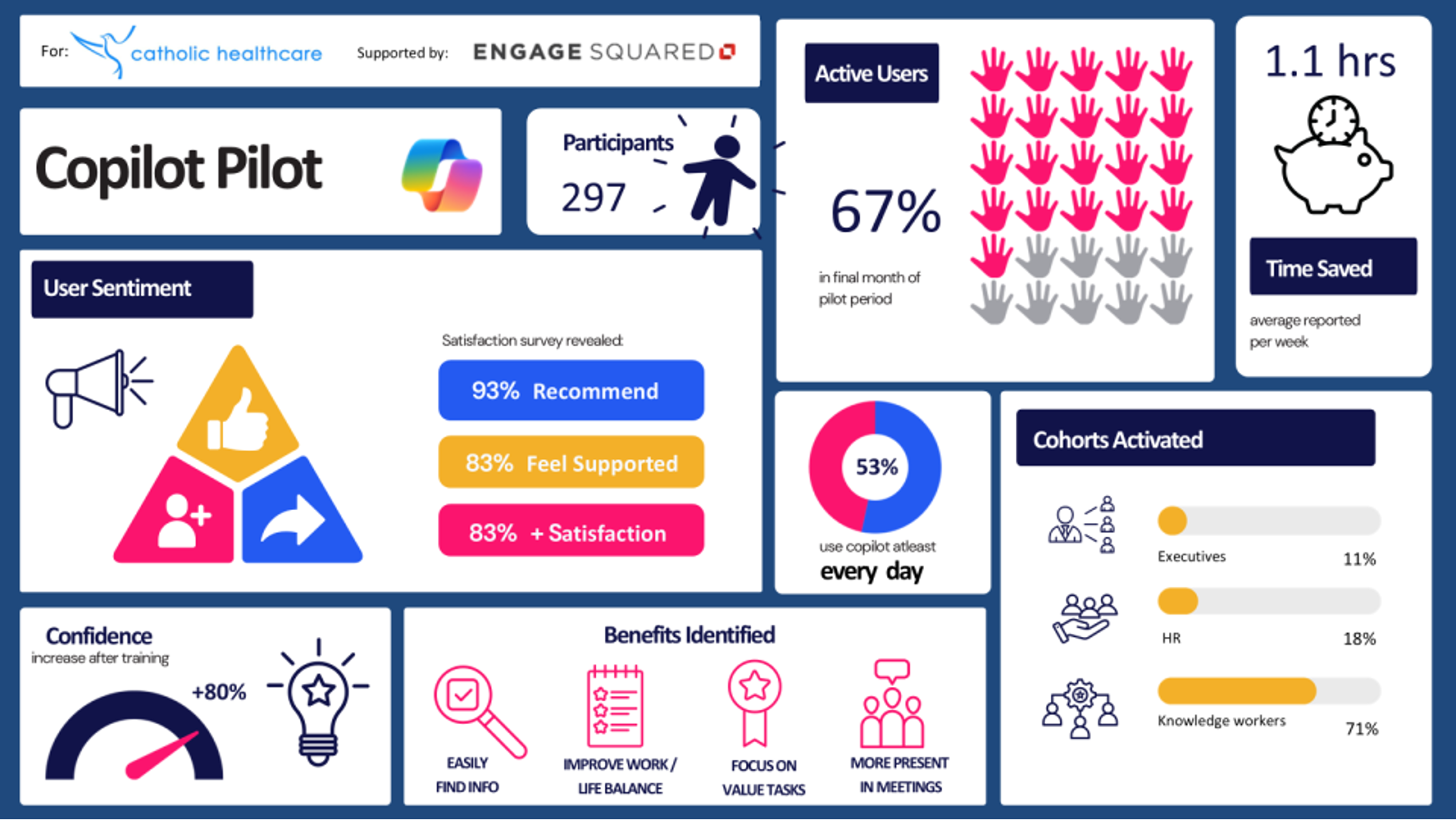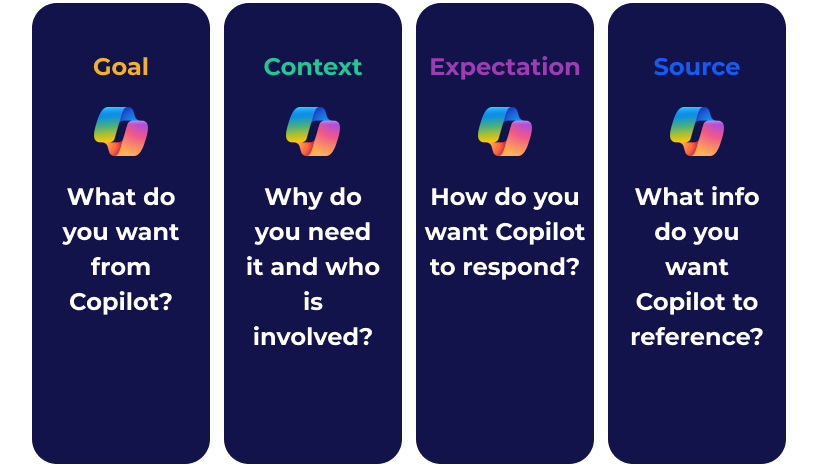
Catholic Healthcare is a leading provider of aged care, health, and community services across New South Wales and Southeast Queensland. Established in 1994, the organisation supports individuals through 41 residential aged care homes, 13 retirement living communities, and home care services for nearly 7,000 people in the community. Guided by values of compassion, courage, and integrity, Catholic Healthcare is dedicated to delivering high-quality care and support to meet the diverse needs of the communities it serves.
Client
Catholic Healthcare
Industry
Healthcare
Organisation Size
Medium
Country
Australia
Services
Pilot for Microsoft Copilot 365
Technologies
Copilot for Microsoft 365
Context
When you’re balancing the needs of your team with the needs of the community, every hour counts. That’s why Catholic Healthcare set out to explore how Microsoft 365 Copilot could give people their time back—time they could spend on strategic work, smarter decision-making, or simply being more present in the work they care about.
With 300 Copilot licenses acquired, Catholic Healthcare partnered with Engage Squared to design a pilot program that would do more than test new tech. It would build capability, confidence, and momentum – laying the groundwork for broader AI adoption and long-term value.
This case study walks through two key phases of the project. Phase one; an early pilot focused on leadership, knowledge workers and building a champion network. Followed by phase two; a targeted roll-out into HR teams.
The challenge
Catholic Healthcare acquired 300 Microsoft 365 Copilot licenses with a vision to foster smarter, more efficient workflows for their organisation. Recognising that change often starts at the top, executives and senior leaders were given early and priority access. But with a workforce of over 5,000 employees, how do you determine which other groups should be next in line for Copilot access?
The goal was to ensure the groups that did receive early access would deliver the most value across the business.
Our approach
Catholic Healthcare knew early on that a group of executives and senior leaders, would receive immediate access to Copilot. This cohort was our primary focus for stage one as the broader license distribution was still being confirmed.
To kick things off, we ran a series of Art of the Possible workshops, creating space for leaders to explore what Copilot could do – not in theory, but within their own context and everyday working lives. We made sure they could experience first-hand what Copilot could do for core use cases like senior executives drafting emails more efficiently, and how their day-to-day productivity could be transformed by surfacing the right files in seconds instead of searching manually.
Through these workshops, we demonstrated Copilot’s limitless possibilities and immediate value as a powerful AI assistant.
From there, we delivered tailored training sessions, focusing on practical and high-impact scenarios. Copilot isn’t just another app to learn and introduce; it becomes an intelligent layer across the systems Catholic Healthcare were already using. It was crucial to demonstrate how Copilot fits naturally into their daily work, rather than disrupting it.
As momentum built, a small group of knowledge workers were also brought into test everyday scenarios and provide feedback. Their insights helped shape future sessions and provided early success stories to share more broadly.
When the broader rollout group was confirmed, we designed a bespoke change and adoption plan to support their onboarding, whilst continuing to ensure leaders had access to training and support where needed.
The bespoke change and adoption plan included:
- A Copilot briefing session on the day licenses were assigned
- A four-week training series to build confidence by using Copilot in everyday tasks like drafting emails, quickly finding the right information.
- We also introduced ongoing support mechanisms, including weekly drop-in sessions for real-time problem-solving and a Teams Community Hub as a centralised resource for updates, training materials, and success stories.
Of course, with any AI rollout, having the right technical configuration and environment is critical. Copilot can only be effective if it is configured in a secure, well-prepared digital space. To enhance the readiness of Catholic Healthcare’s technical environment, our team also:
- Conducted Site Security Reviews to identify and address potential gaps, ensuring the digital space was secure and compliant
- Provided a series of recommendations so that the technical team at Catholic Healthcare could complete a Data Security Uplift to mitigate risks and create a stable environment for Copilot usage.
Throughout this phase, we also focused on developing a dedicated Copilot champions network which comprised of trusted advocates among senior leaders who could promote Copilot’s value and inspire adoption across the organisation. By equipping these champions with the tools and confidence they needed, we laid the groundwork for broader success in Phase two.
Phase Two
With leaders already embracing Copilot, the next step was bringing it to a cohort where they could feel the impact of Copilot day-to-day: HR teams. HR is at the heart of any organisation, juggling policy updates, onboarding new employees, supporting employee wellbeing, managing major operational processes – the list goes on. So, how could Copilot ease some of that load? Catholic Healthcare wanted to make sure that HR had the right support to explore Copilot in a way that truly made sense for them. What would it look like to save an hour a week on admin? What areas could Copilot really help save time?
This phase was about helping people feel confident, giving them space to experiment and qualifying what worked, so that Catholic Healthcare could keep building on what makes Copilot valuable to their organisation.
Our Approach
We knew that for the HR teams to really see the value of Microsoft Copilot, the training needed to feel relevant from day one. We built a tailored enablement program just for them, focused on the real-world tasks they handle every day.
To start, we worked with the team at Catholic Healthcare to understand what a typical week would look like in HR. Writing policies, drafting documents, answering questions, preparing content – it was clear Copilot could support these activities, but only if the team could see it in action.
We built a set of tailored training materials to tell this story. The decks, hands-on walkthroughs and example scenarios were all rooted in HR-specific tasks using familiar language and context they could instantly relate to. Each session was designed to explain more than how Copilot works, but how it fits naturally into their workflows.
We delivered:
Three hands-on training sessions over three weeks, covering practical HR workflows.
We also held drop-in Q&A sessions where between training weeks, HR teams had the chance to try Copilot for themselves at their own pace, ask questions, test our real scenarios, ask questions and share what they were learning with peers.
To keep the momentum going outside of training sessions, we set up a dedicated Teams space to serve as a central hub for communication, resources and peer-to-peer support. This became a go-to place for learning materials, feature updates and ongoing engagement across the wider Copilot pilot group.
We complemented this by conducting a survey with all Copilot users to capture feedback, success stories and uncover opportunities to further improve and optimise Copilot use across the organisation.
Impact and results
Rolling out Microsoft 365 Copilot in two distinct phases gave us the opportunity to build momentum thoughtfully, from executive enablement to frontline enablement. The pilot has set a solid foundation for confident Copilot use across Catholic Healthcare, building capability, encouraging exploration, and setting the stage for long-term adoption.
The pilot delivered promising results across both phases:
- 85% Adoption Rate: Over 200 users actively used Copilot within the first month.
- Intensive use: 53% of respondents reported using Copilot at least daily, with the rest advising it was at least weekly.
- Leadership engagement: Senior stakeholders embraced Copilot, modeling its use and inspiring broader confidence in its potential.
- 1 hours of average time savings per user, per week
- Over 80% of participants reported an increase in confidence in using Coilot after training.
Self-reported benefits from employees included:
- Faster access to the right information
- Improved work/life balance
- Being able to focus on valuabl tasks
- Better focus during meetings and being more present
- The HR cohort reported a better understanding of Copilot and more confidence in using it in all scenarios.
From executive alignment to knowledge workers, Catholic Healthcare’s Copilot journey shows what is possible when technology is rolled out strategically with people in mind. With a growing network of Copilot champions, and a clear view of where Copilot is adding value, Catholic Healthcare is well placed to scale adoption further and continue building its AI maturity over time.
Additionally, Catholic Healthcare has invested in our M365 Evergreen service, ensuring their teams continue to receive expert change management support (such as training, use case ideation, and champion support) and can adopt new features rolling out to Microsoft 365 and Copilot.

Microsoft 365 Copilot results at Catholic Healthcare


